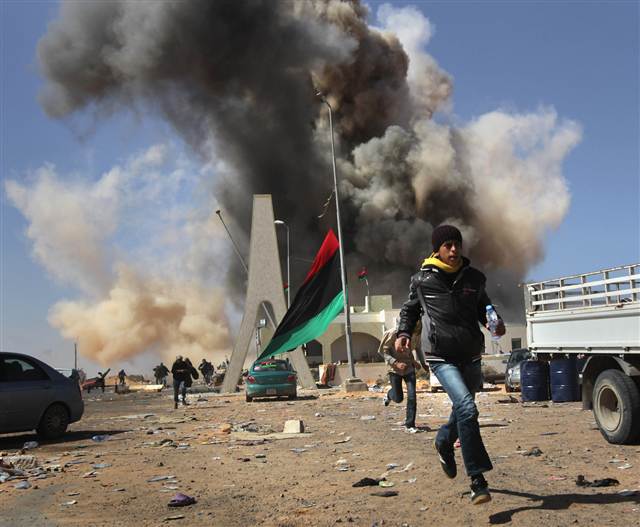
Under NATO’s Flag: An Interim Assessment of the Mission In Libya (Part Two)
Publication: Eurasia Daily Monitor Volume: 8 Issue: 152
By:

NATO embarked almost haphazardly in March on the Libya mission. The Alliance became the third entrant to this mission in a rapid sequence, after the United States and the Franco-British tandem. The respective leaderships never defined the political, economic, or strategic interests in Libya for these nations, for NATO collectively, the European Union or the West writ large. Those interests are substantial (see EDM, August 5). However, failure to articulate them undermines domestic support for a prolonged military operation amid a financial crisis.
The mission’s sole declared goal was (and seems to remain) humanitarian: to prevent Colonel Muammar Gaddafi’s forces from inflicting reprisals on rebels and civilians alike. But unlike NATO’s 1999 intervention in Kosovo, where a mass-scale “humanitarian crisis” was a demonstrable fact, the decision to intervene in Libya was basically preventive: to stop a massive humanitarian crisis from developing. Moreover (and again unlike Kosovo), this decision involved taking sides in an incipient civil war. On both of these counts, the intervention in Libya significantly lowered the threshold for humanitarian intervention.
Beyond that shared rationale, each of the major participants (Washington, Paris, London, and NATO) proceeded from its own specific motivations, short-term and non-strategic, rather than common strategic objectives. Their motivations were for the most part unrelated to Libya or, at best, indirectly related to it.
In Washington, one group of administration officials invoked a presumed “responsibility to protect” the peoples of the world from violence. Lamenting US nonintervention in past atrocity cases (Rwanda, Srebrenica, Darfur), these officials urged US military intervention in Libya to validate that universal protection doctrine. An overlapping group in the administration believed that Gaddafi’s victory over the insurgents would discourage democratic revolutions in the wider Arab world. Based on this double misjudgment, they supported intervention in Libya to promote larger goals extending far beyond Libya. The administration also wanted to showcase multilateralism with a UN Security Council mandate. The Pentagon, however, strongly resisted any diversion of military resources to Libya from existing missions. President Barack Obama decided that the US would open the hostilities in Libya but hand over the lead quickly to European allies.
French President Nicolas Sarkozy leaped at the chance to lead a European intervention in Libya. Trailing badly in the polls in this pre-election year, Sarkozy expected to regain his conservative base of support by showing French military strength and leadership in Europe. He also bid for socialist and liberal support by embracing humanitarian intervention and accepting Bernard-Henri Levy, the nation’s foremost left-liberal pundit, as his liaison with Libyan rebels. Sarkozy quickly convinced British Prime Minister, David Cameron, to undertake a Franco-British operation in Libya. While slashing the military budget to a historic low, Cameron’s government wanted to demonstrate that Britain remains combat-capable in the Mediterranean, and qualify alongside France for a lead role in European defense. The Franco-British decision-making process was rushed, highly personalized, short-circuiting institutions, and discounting the military’s reservations.
The US objected to a Franco-British operation in Libya. This format involved a number of drawbacks. It could unhelpfully remind Arabs of the 1956 Anglo-French-Israeli operation in Egypt. It would bypass NATO and, thus, the US-headed chain of command. And it could potentially institutionalize a Franco-British defense tandem, at the expense of NATO’s lead role in Europe and even of the US-British special relationship. The US had launched its Libya operation on March 19, hurried to hand it over by April 7, and downloaded it to NATO.
Among European allies, many welcomed the chance to restore NATO’s credibility in Libya, after a long drawn-out failure in Afghanistan. Many also felt that NATO had to regain American confidence, take over this mission from an overextended US, and show that Europeans are still capable of acting despite drastic cuts in their military budgets. However, NATO’s decision to rely almost entirely on air power meant that only a handful of allies could actually participate in combat.
The Alliance’s Secretary-General, Anders Fogh Rasmussen, embraced a universal “responsibility to protect” peoples from violence as the sole rationale for the Libya intervention. This doctrine, however, has no basis in any NATO documents; and it contradicts the spirit of NATO’s new Strategic Concept, only recently adopted at the Alliance’s Lisbon summit, which has re-emphasized the Alliance’s core mission to protect its member countries (http//www.nato.int/strategic-concept, November 2010). If taken seriously, a universal humanitarian responsibility would drain NATO of resources that are already being misallocated by many member countries, and diminishing in net terms. The Secretary-General himself is second to none in decrying this state of affairs (Anders Fogh Rasmussen, “NATO After Libya: The Atlantic Alliance in Austere Times,” Foreign Affairs, July-August 2011, pp. 2-6), which a protracted intervention in Libya aggravates even further.
France, Britain, NATO collectively, and (initially) the Obama administration embarked on this mission each from its specific motivations. But they commonly seemed to expect the proverbial brief victorious war, against rudimentary forces in a wide-open country, with no significant impact on NATO’s resources. That shared assumption has not been borne out; and NATO is not debating why and how this happened.




